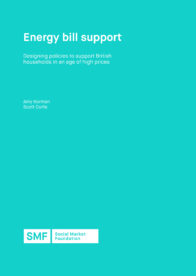Energy bills are expected to remain high for several more years, and are a reminder that we do not have durable and considered bill policies at a UK level. In this joint interim report with Public First, we set out a series of choices and challenges around the future of energy bill policy. It is part of a wider project commissioned and supported by Citizens Advice.
Key points
- With average bills at £3,000, we calculate that 12m households would spend over 10% of their income after housing costs on energy. Of those 12m households in need, a quarter do not receive any social security.
- Long-term policies to help with bills should be targeted on households in need, but state needs better mechanisms for identifying people in need of help and getting it to them.
- Voters are increasingly prepared to accept higher taxation to fund bill support. In July, 52% of people we polled said they supported bill support policies “even if this means taxes rise as a result”. In October, this had risen to 64%.
Options for policy
- Bill support
- We’ve estimated the policy designs for options of fixed payment discount, unit rate discount, rising block tariff and a real bill cap. We also found the real bill cap to garner the least public support, and risks giving biggest benefits to wealthiest and encouraging wasteful energy consumption.
- Energy efficiency
- Targeted support for energy efficiency would require broader eligibility criteria than price support.
- In choosing between the fuel poverty and demand reduction approach for providing government support, our modelling suggests that the former is less expensive – but has longer payback period
- In principle, the public are very supportive of the idea that there should be a government energy efficiency scheme, but are divided on whether the support should be targeted or universal.
As an interim report, this document does not reach many firm conclusions or make recommendations. Instead, its primary purpose is to facilitate debate and thinking around long-term policymaking. To that purpose, the report ends with the questions we think arise from our work to date.
Those questions will form the basis of a consultation exercise that begins with the publication of this report and concludes in early 2023. We will then publish our final report, with recommendations for future policy in the spring of that year.
If you’re interested in our project, please do reach out to us at energy.bills@smf.co.uk


